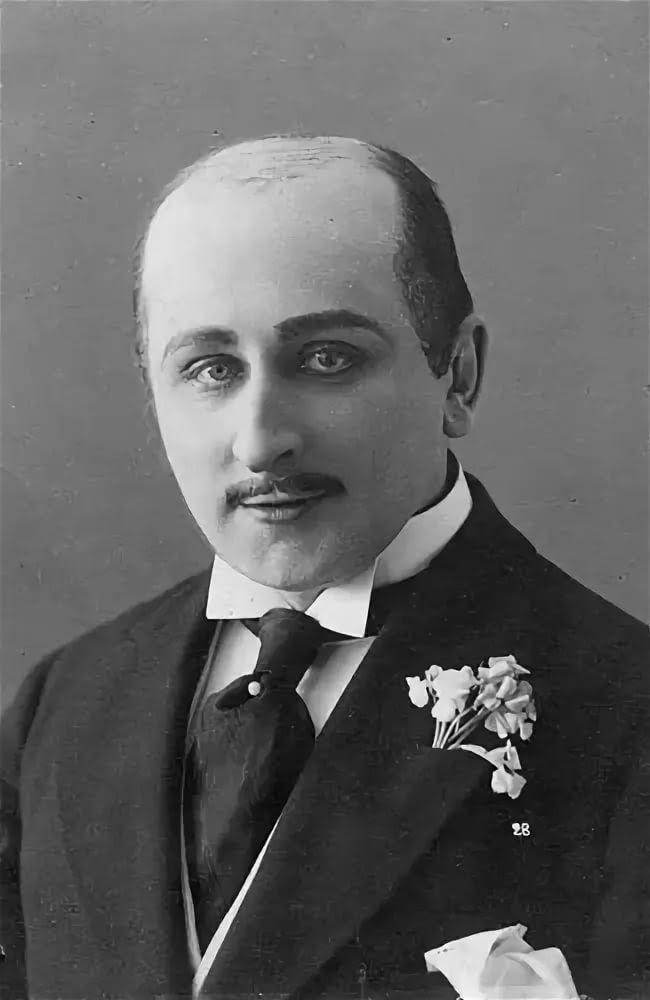In Nabokov’s last Russian novel, there appears a minor character, named Goryainov, who was well known for the fact that being able to imitate beautifully (by stretching his mouth wide, making moist ruminant sounds, and speaking in falsetto) a certain unfortunate, cranky journalist with a poor reputation, he had grown so accustomed to this image (which thus had its revenge on him) that not only did he also pull down the corners of his mouth when imitating other of his acquaintances, but even began to look like it himself in normal conversation. (Gift 195)
It is worth noting that Nabokov bestowed a theatrical last name on this bizarre offstage thespian. Goryainov was the surname of an acting family, father and son, Anatoly (1850–1901) and Boris (1883–1944), whose nom de scène was Gorin-Goryainov. In all likelihood, Nabokov, a theater buff, was familiar with the work of the son, Boris Gorin-Goryainov, who since 1911 had been part of the famed Alexandrinsky Theater troupe in St. Petersburg. Nabokov could have seen Boris Gorin-Goryainov on its stage, for example, in his debut role as Khlestakov in Nikolai Gogol’s The Government Inspector (1911), in the title role in Pierre Beaumarchais’s The Marriage of Figaro (1914), or in the title role in Alexander Sukhovo-Kobylin’s The Death of Tarelkin (1917), co-staged by Vsevolod Meyerhold (with Alexander Lavrentiev) as part of the dramatist’s trilogy (see respectively B. A. Gorin-Goryainov, Moi teatral´nyi opyt [Leningrad: Leningradskii Gosudarstvennyi Ordena Trudovogo Krasnogo Znameni Akademicheskii Teatr Dramy im. A. S. Pushkina, 1939], 56, 47–48, and between 32 and 33; Viktor Seleznev and Elena Selezneva, “A. V. Sukhovo-Kobylin v 1917 godu,” in M. V. Bezrodnyi, N. A. Bogomolov, A. V. Lavrov, comps., Rossiia i Zapad: sbornik statei v chest´ 70-letiia K. M. Azadovskogo [Moscow: Novoe literaturnoe obozrenie, 2011], 459).
Nabokov presumably also alludes to Boris Gorin-Goryainov later in the novel by way of Fyodor Godunov-Cherdyntsev’s intimation that the actor’s fictional namesake, “could recite marvelously ‘Woe from Wit’ as well as Ivan the Terrible’s dialogue with the Lithuanian ambassador (when he used to do a splendid imitation of a Polish accent)” (Gift 319). We come across this persona once again: Goryainov is mentioned as a Committee member of the Union of Russian Writers in Germany (see Gift 317). Curiously, as is often the case with Nabokov’s oeuvre, life imitates art here: Boris Gorin-Goryainov authored four books, including three volumes of his stage memoir and a novel about Fedor Volkov (1729–63), the founder of the Russian theater, but they appeared between 1939 and 1947, that is after the serialized publication of Dar (1937–38).
Goryainov, of course, prefigures Jack Cockerell. Like Goryainov, who obsessively impersonates “a certain unfortunate, cranky journalist,” Cockerell compulsively mimics Pnin. “A man of great moral courage, a pure man, a scholar and a staunch friend, serenely wise, faithful to a single love,” Pnin is misunderstood and ridiculed by his various colleagues, “many an average intellectual,” to whom “he seems a figure of fun” (Vladimir Nabokov: Selected Letters,182). One of them, Cockerell, while lampooning Pnin, “had acquired an unmistakable resemblance to the man he had now been mimicking for almost ten years” (Pnin 187). As in the case of Goryainov, that compulsive mimicking, “this Pnin business,” appears to wreak “some poetical vengeance” upon Cockerell by turning his cruel, sadistic behavior toward his Waindell colleague into “the kind of fatal obsession which substitutes its own victim for that of the initial ridicule” (Pnin 189).

https://meshok.net/item/82770313_B2#&gid=1&pid=1
—Gavriel Shapiro, Ithaca, New York
